Modules
- Workforce Management
- Talent Management
- Talent Profiles and skills
- Diversity and inclusion
- Career mobility
- Performance management
- Learning
- Compensation and Payroll
- Employee Experience
- Advanced analytics
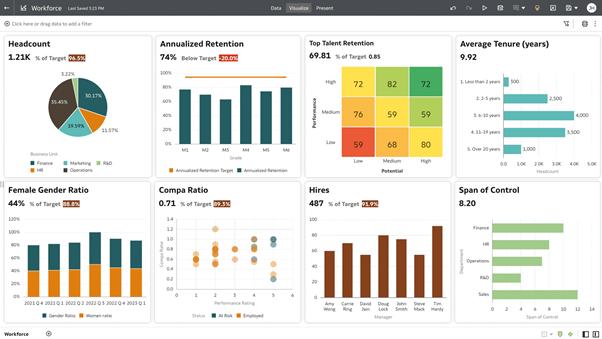
Get insights into employee headcount, hires, and transfers
Analyze headcount across multiple dimensions, such as job family, length of tenure, and top talent. Monitor headcount trends year over year by various categories, including age band and geography.
Understand the impact of unplanned absences
Identify frequency and type of absences to minimize negative effects on teams’ productivity. Examine absence data by different dimensions, such as performance rating, location, trends, and more.
Sample prebuilt KPIs/metrics
- Headcount, FTE, hires
- Promotions rate
- Headcount movement
- Gain hire, transfer, promotion
- Loss termination, reorganization
- Assignment gain, hire
- Span of control
- Compa ratio
In-depth analysis of team effectiveness
Quickly perform organizational health checks by examining key workforce management metrics, such as span of control, gender ratio, compa ratio, employee retention, promotions, and average years of service.
Understand changing workforce dynamics
Foster workforce mobility and reduce attrition by analyzing internal transfers, reorganizations, and terminations over time. Understand the root cause of headcount gains and losses.
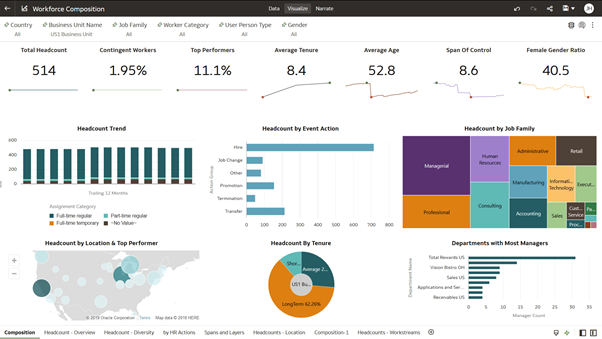
Measure and track every stage of recruitment
Better understand candidate pipeline performance with access to automatically updated recruiting metrics, such as number of open job requisitions, volume of applications by business unit and geography, offers accepted and declined, and positions filled.
Identify high performers early on
Capture the profiles of candidates most likely to become high-performing and longer tenured employees.
Sample prebuilt KPIs/metricsHires (referral, internal, etc.)
- Talent yield
- Drop-off rate
- Offer acceptance rate
- Hires to goal
- Time to hire
- Average time-to-fill
Requisition fill rate
Improve recruiting performance
Increase recruiting operations efficiency across the entire organization with prebuilt KPIs, such as time-to-hire, fill rate, and time-to-fill across business units, departments, and managers.
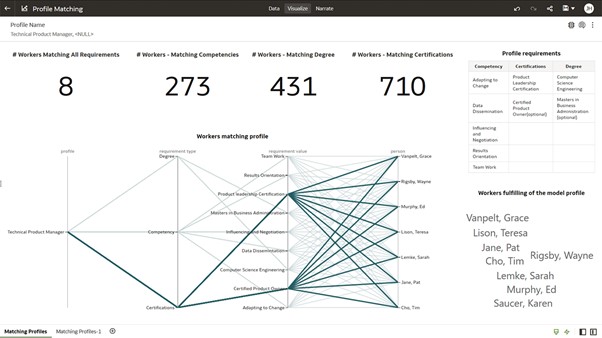
Understand your organization’s skills matrix
Identify organizational strengths and weaknesses and identify potential skill gaps. Analyze job requirements based on workers' competencies, degrees, licenses, certifications, memberships, and awards.
Create more effective succession plans
Assess the ratio of candidates to succession plans, individual candidates’ readiness to move to the next level, and the qualifications of candidates under consideration.
Sample prebuilt KPIs/metrics
- Number of high performers
- Number of high potential workers
- Number of workers ready for a career move
- Number of workers ready for domestic travel
- Number of workers ready for international travel
- Number of workers willing to relocate
- Number of workers with impact of loss
- Number of workers with risk of loss
Match model profile requirements
Easily find internal talent with the correct skills or certifications. Assess workers' performance to determine skill set match to specific jobs or positions.
Analyze risk and impact of loss of top talent
Examine all talent review meetings within the organization, including information on top performers as assessed by management.
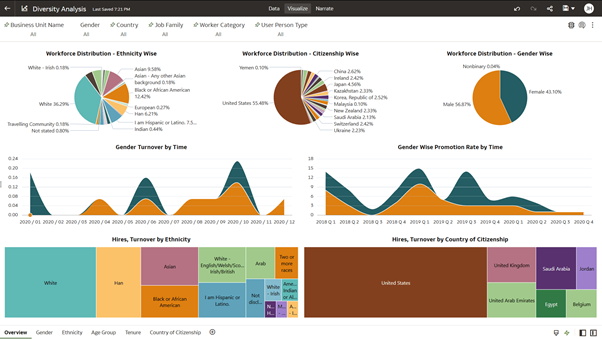
Track diversity indicators against organizational goals
Measure goals and analyze various dimensions of diversity, including employee gender, pay grade, ethnicity, tenure band, age band, and country of employment.
Analyze diversity demographics and trends
Ensure hiring and compensation equity by comparing demographic data, such as gender, veteran status, and other factors, when reviewing applications and offers. Spot biases by analyzing absence approvals and rejections by gender, ethnicity, tenure band, age band, and religion.
Sample prebuilt KPIs/metrics
- Female gender ratio
- Average worker age
- Average tenure
- Manager gender ratio
- Distinct worker nationalities
- Distinct worker ethnicities
- Percentage of workers hired above 60 years of age
- Applications and offer diversity
Understand diversity’s impact on satisfaction and performance
Study how diversity impacts employee performance by using trend analysis to measure productivity against D&I initiatives.
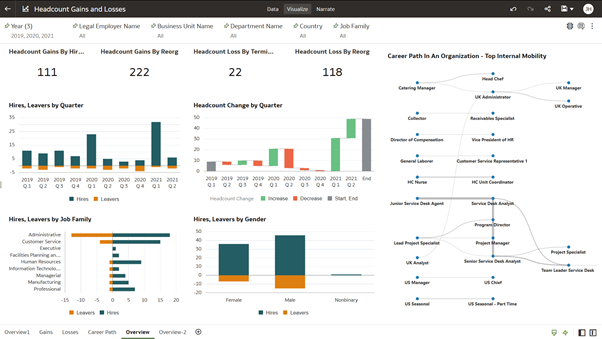
Monitor internal mobility by HR activities
Track who is moving by promotion, transfer, or grade change within your organization. Reduce attrition by examining internal transfers, reorganizations, and terminations over time.
Visualize and discover new career paths
Track internal and external mobility trends and turnover. Analyze career path trends for jobs, grades, and positions to create new opportunities and reduce attrition.
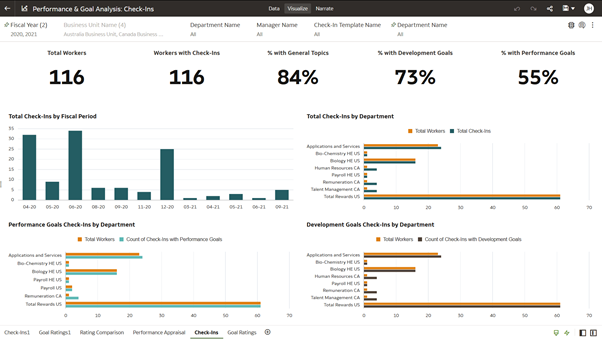
Discover key patterns of top performers
Oracle Fusion HCM Analytics enables organizations to identify and retain top performers by understanding what motivates them. Also analyze performance by individual, team, or organization to uncover which employees may be a potential flight risk.
Analyze employee engagement
Examine managerial engagement relationship to employee performance. Track check-ins between managers and employees to ensure on-time employee performance appraisals, monitor progress, and improve intradepartmental communications.
Sample prebuilt KPIs/metrics
- Overall worker rating
- High performers
- High potential employees
- Manager section rating
- Incomplete performance appraisals
- Performance rating distribution
- Delayed performance tasks
Measure alignment of performance with business goals
Track goal attainment to understand how well departments, business units, and regions have aligned performance goals with business goals.
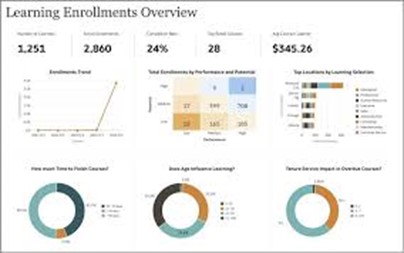
Tie learning content to employee career mobility
Link required competencies and skills to specific learning content, making it easier for managers to track performance and goals and help employees map their career path.
Enhance the ROI of learning
Expand the ROI of learning programs to strategic HR business goals, such as employee career development, employee satisfaction, employee retention, and so on.
Sample prebuilt KPIs/metrics
- Average cost per learner
- Learning hours—completed assignments
- Number of active course enrollments
- Number of active enrollments
- Number of active learners
- Required learning completion count
- Self-paced learners
- Voluntary learning enrollments completion rate
Increase employee satisfaction with a more targeted learning program
Curate and offer a more targeted learning program that’s in sync with the organization’s business goals.
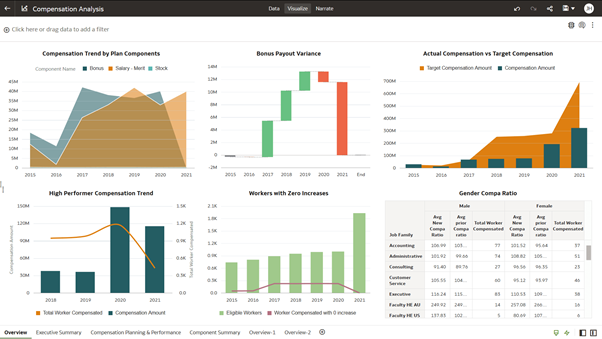
Easily compare compensation plans in a consolidated view
Find trends and variances in analyzing multiple compensation plans, their components, and associated budgets over time. Slice and dice by any number of worker categories and drill down to different levels of compensation, including worker, team, and department.
Analyze the impact of payroll on the entire organization
Hire, retain, and promote top talent faster, and detect anomalies in workforce cost throughout the organization by analyzing vast and complex volumes of cross-departmental payroll data at any point in time.
Sample prebuilt KPIs/metrics
- Balance value period ago
- Balance value variance
- Compa-ratio (current workforce average and leavers average and new compa-ratio based on proposed salary during compensation planning)
- Compensation variance based on gender and performance rating
- Growth rate (standard earnings and supplemental earnings)
- High performer/medium performer/low performer salary change rates
- Period-to-date balance value (month to date, quarter to date, year to date)
- Time since last salary change
View workforce performance spread across compa-ratio band
Bring together compensation, performance, and attrition data to identify potential trouble spots, such as top talent attrition. Easily compare salaries to the industry standard by identifying top performers with a lower compa-ratio band and make adjustments to retain your best people.
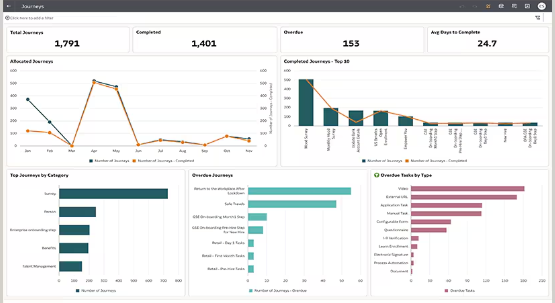
Get insights on employee journeys
Optimize processes, enhance communications and foster continuous learning and growth through end-to-end employee lifecycle metrics including key milestones, pain-points and other drivers of engagement.
Understand intelligent HR services rendered to every employee
Identify bottlenecks, optimize processes and enhance resolution times by analyzing employee inquiries, request categories, agent efficiency and other KPIs across HR service requests.
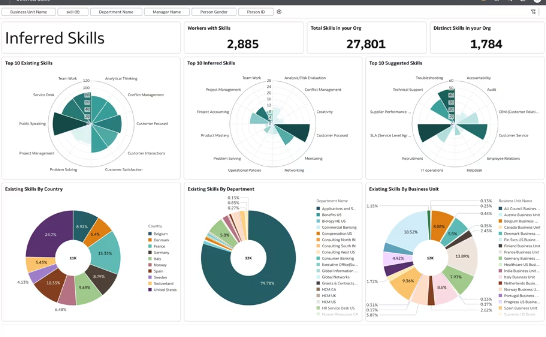
Uncover anomalies such as unconscious bias and their consequences on the workforce
Identify trends and detect patterns of inconsistency around hiring, promotions, terminations, salaries, and other factors across different regions, gender, age, and ethnicities to ensure the continuity of fair hiring practices.
Drive strategic workforce planning through ML-based skills currency
Track and analyze employee skills and address skill gaps at any point in time to make informed decisions on career paths, teams, current and future projects, and more. Facilitate streamlined and precise recruitment anchored on skills rather than job titles. Stay proactive in adapting to industry trends by cohesively upskilling and reskilling the workforce.
Implement a continuous listening strategy with an integrated analytics solution
Analyze any kind of internal and external feedback data in the entirety of the employee lifecycle in conjunction with other HR metrics. Conduct a comprehensive evaluation of your workforce's present state, establish connections between HR objectives and business outcomes, and predict patterns of risks and achievements at any given juncture.